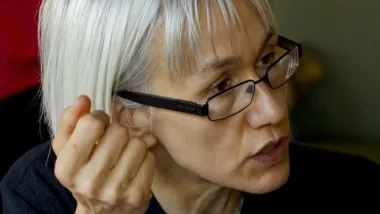The fall is high season for school visits from prospective students. I am a great believer in doing this remotely—while some greenhouse gases are generated by a Google search it is far less than a plane ride to a distant campus. I suggest visiting schools only after you have been admitted (and not even then if you don’t have a really crucial question that can only be answered on site). However, if you can’t bring yourself to even apply to a school in a place you’ve never visited, and promise to buy carbon set asides, a tour may be worth it. The following tips can help you make the most of the school.
The fall is high season for school visits from prospective
students. I am a great believer in doing this remotely-while some greenhouse
gases are generated by a Google search it is far less than a plane ride to a
distant campus. I suggest visiting schools only after you have been admitted
(and not even then if you don't have a really crucial question that can only be
answered on site). However, if you can't bring yourself to even apply to a
school in a place you've never visited, and promise to buy carbon set asides, a
tour may be worth it. The following tips can help you make the most of the
school.
- Try to
go to an open house. You'll not only meet faculty and see the school,
you'll also meet students who might be your graduate school peers. - If you
are going independently, don't contact faculty directly to organize your
visit, except as a last resort. Most schools have a graduate program administrator
who can provide information and assist with campus visits. If there isn't
an administrator, a faculty member who is the program director may have
this as part of their job description. They can coordinate schedules
better than you could. - Come
prepared. Read the web site for the program and come with additional
questions for the program administrator, faculty, or students. If the
question is fully answered on the web site, don't ask it-use the time to
check out the local area. - Ask
questions that show you have investigated the school. Don't start an
interview with a faculty member by asking "Tell me about your research".
If they have a strong research program their publications will be
available and they will wonder why you haven't read them; if they don't, you'll get to hear about the Environmental Impact
Statement they wrote for a highway rest stop in 2001. Instead ask
questions along the following lines (and these are just a sampling--there are many more):- "I
noticed you have written a lot on solid waste disposal planning, has
there been much funding around for that kind of thing recently?" This
indicates you know their research and want to understand the logistics of
doing it; it can also help you raise the issue of research grants and
contracts (including funding for students). - "What
do you think students like most about the program?" - "What
campus-wide opportunities and resources do students seem to appreciate
the most?"
- "I
- Talk
with students as they can provide a really valuable perspective. - Do a basic
campus tour to get oriented and find out the range of facilities. - Don't
expect faculty to review your vita or statement. Many faculty won't do it out of
fairness to other candidates and in consideration of the time it takes
away from work they could be doing with current students.
For other advice on applying to graduate school see my
recent post
on writing statements of purpose and my earlier one on applying to
graduate school.

Planetizen Federal Action Tracker
A weekly monitor of how Trump’s orders and actions are impacting planners and planning in America.

Chicago’s Ghost Rails
Just beneath the surface of the modern city lie the remnants of its expansive early 20th-century streetcar system.

Amtrak Cutting Jobs, Funding to High-Speed Rail
The agency plans to cut 10 percent of its workforce and has confirmed it will not fund new high-speed rail projects.

Ohio Forces Data Centers to Prepay for Power
Utilities are calling on states to hold data center operators responsible for new energy demands to prevent leaving consumers on the hook for their bills.

MARTA CEO Steps Down Amid Citizenship Concerns
MARTA’s board announced Thursday that its chief, who is from Canada, is resigning due to questions about his immigration status.

Silicon Valley ‘Bike Superhighway’ Awarded $14M State Grant
A Caltrans grant brings the 10-mile Central Bikeway project connecting Santa Clara and East San Jose closer to fruition.
Urban Design for Planners 1: Software Tools
This six-course series explores essential urban design concepts using open source software and equips planners with the tools they need to participate fully in the urban design process.
Planning for Universal Design
Learn the tools for implementing Universal Design in planning regulations.
Caltrans
City of Fort Worth
Mpact (founded as Rail~Volution)
City of Camden Redevelopment Agency
City of Astoria
City of Portland
City of Laramie






























